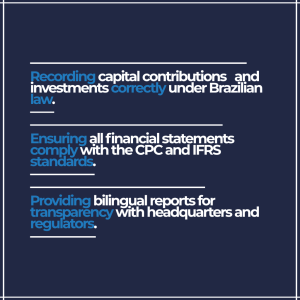1. Understanding the Brazilian Context for FDI

Brazil has been one of Latin America’s main destinations for foreign direct investment (FDI). With a diversified economy, strong industrial base, and a consumer market of over 200 million people, international companies see Brazil as a strategic hub for Latin America.
However, doing business here means understanding a complex legal and accounting system. Local accounting plays a central role in ensuring transparency, legal compliance, and financial efficiency for foreign investors — transforming bureaucracy into strategy.
2. What Are the Accounting Requirements for Foreign Companies in Brazil?

Every foreign investor entering Brazil must follow local accounting rules established by the Brazilian Accounting Standards Committee (CPC), which are aligned with IFRS (International Financial Reporting Standards) but include local adaptations.
Accounting is responsible for:
- Recording capital contributions and investments correctly under Brazilian law.
- Ensuring all financial statements comply with the CPC and IFRS standards.
- Providing bilingual (Portuguese/English) reports for transparency with headquarters and regulators.
A qualified Brazilian accounting firm acts as the investor’s local financial translator — converting global standards into the Brazilian format required for compliance and tax efficiency.
3. How Does FDI Registration Work in Brazil?

Foreign investors must register their capital with the Central Bank of Brazil through the RDE-IED (Electronic Declaratory Registration – Direct Investment) system.
This step formalizes the investment and ensures future rights to repatriate profits or sell equity. The accountant is responsible for:
- Preparing and submitting the registration to the Central Bank.
- Updating the investment data whenever there are capital increases, reductions, or equity transfers.
- Ensuring compliance with deadlines and regulations to avoid penalties.
Without proper accounting control, companies may face restrictions when sending profits abroad or reinvesting capital.
4. What Tax and Accounting Standards Apply to FDI in Brazil?

Foreign-invested companies are subject to the same tax rules as Brazilian entities, but strategic accounting management can significantly reduce costs.
The main taxation systems are:
- Lucro Real (Actual Profit) – mandatory for large companies and those in regulated sectors.
- Lucro Presumido (Presumed Profit) – suitable for medium-sized operations.
Brazilian accountants help foreign investors:
- Choose the most advantageous tax regime.
- Apply tax treaties to avoid double taxation.
- Calculate withholding taxes (IRRF) on profit remittances.
- Manage transfer pricing, CIDE, IOF, and other cross-border taxes.
Tax complexity in Brazil can turn into a competitive advantage — when managed by experts.
5. How Does Brazilian Accounting Differ from IFRS and US GAAP?

Although Brazil follows IFRS, there are local interpretations and fiscal adjustments that impact reporting:
- Some tax rules override accounting treatments (for instance, on depreciation or revaluation).
- Provisions and contingencies must align with local tax authority expectations.
- Reporting currency and exchange rates follow specific Central Bank criteria.
For multinational groups, accountants in Brazil prepare both local statutory statements and consolidation reports aligned with the parent company’s standards. This dual approach guarantees compliance and transparency at both local and global levels.
6. What Are the Key Compliance Risks for Foreign Investors?

Foreign companies face strict obligations related to:
- Corporate structure: every Brazilian company must have a legal representative resident in Brazil.
- Accounting and tax filings: monthly bookkeeping, quarterly balance sheets, and annual reports (SPED, ECF, DCTF, etc.).
- Labor and social contributions: proper payroll control and eSocial compliance.
- Data protection: alignment with Brazil’s LGPD (General Data Protection Law).
A reliable accounting partner ensures that all obligations are met, preventing fines, blocked remittances, and reputational damage.
7. How Accounting Supports Governance and Partnerships

Beyond compliance, accounting in Brazil supports corporate governance and transparency — vital for joint ventures, mergers, or partnerships.
It provides:
- Due diligence and financial analysis before partnerships or acquisitions.
- Continuous reporting for boards and shareholders.
- Assurance for investors, banks, and regulatory agencies.
This transparency fosters trust, simplifies audits, and creates a solid foundation for international expansion.
8. How to Optimize FDI through Strategic Accounting

Smart investors use accounting not only for control, but for decision-making:
- Forecasting the ROI of each business unit.
- Tracking cash flow and cost centers by region.
- Evaluating tax incentives and benefits available for foreign capital.
- Planning profit repatriation and reinvestment strategies.
With strategic accounting, FDI in Brazil becomes predictable and scalable.
9. CLM Controller: Your Accounting Partner in Brazil

With over 40 years of experience, CLM Controller offers full accounting, tax, and compliance support for international companies investing in Brazil.
Our services include:
- RDE-IED registration and Central Bank compliance.
- International tax planning for FDI and partnerships.
- Accounting outsourcing under IFRS and CPC standards.
- Payroll and labor compliance for Brazilian subsidiaries.
- Auditing and financial reporting in English and Portuguese.
Our team of over 120 professionals supports more than 500 clients in Brazil and abroad — helping foreign investors operate confidently within Brazilian law.
10. Conclusion
Foreign direct investment in Brazil can be an extraordinary opportunity — but only with the right accounting guidance.
A strong accounting partner turns Brazil’s complexity into clarity, protects your investment, and ensures your business runs legally and profitably from day one.





0 Comments